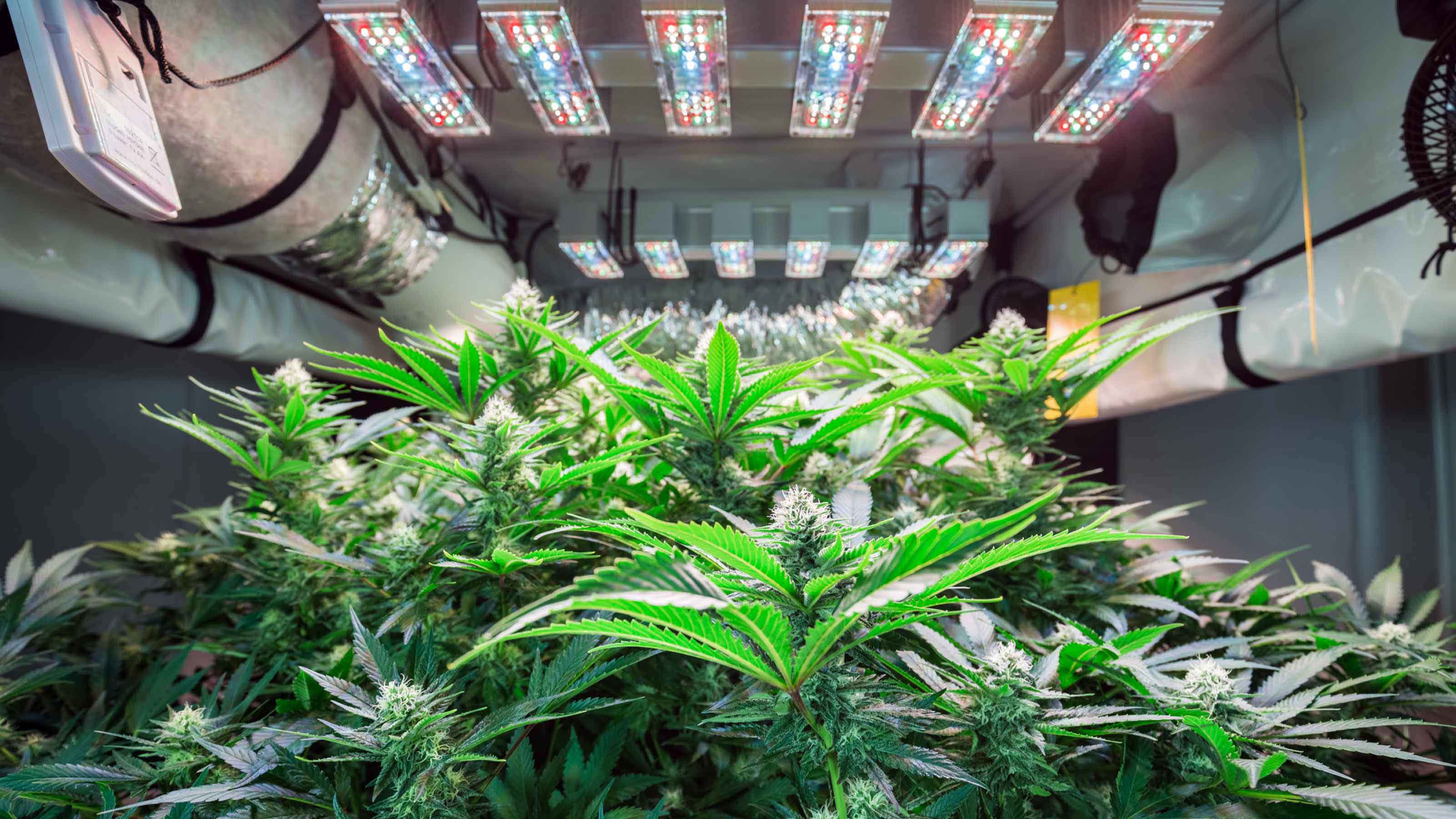How to Invest in Cannabis (Without Buying Cannabis Stocks)
Ancillary companies provide cannabis businesses with materials, technology and services without ever "touching" the plant.


Profit and prosper with the best of Kiplinger's advice on investing, taxes, retirement, personal finance and much more. Delivered daily. Enter your email in the box and click Sign Me Up.
You are now subscribed
Your newsletter sign-up was successful
Want to add more newsletters?

Delivered daily
Kiplinger Today
Profit and prosper with the best of Kiplinger's advice on investing, taxes, retirement, personal finance and much more delivered daily. Smart money moves start here.

Sent five days a week
Kiplinger A Step Ahead
Get practical help to make better financial decisions in your everyday life, from spending to savings on top deals.

Delivered daily
Kiplinger Closing Bell
Get today's biggest financial and investing headlines delivered to your inbox every day the U.S. stock market is open.

Sent twice a week
Kiplinger Adviser Intel
Financial pros across the country share best practices and fresh tactics to preserve and grow your wealth.

Delivered weekly
Kiplinger Tax Tips
Trim your federal and state tax bills with practical tax-planning and tax-cutting strategies.

Sent twice a week
Kiplinger Retirement Tips
Your twice-a-week guide to planning and enjoying a financially secure and richly rewarding retirement

Sent bimonthly.
Kiplinger Adviser Angle
Insights for advisers, wealth managers and other financial professionals.

Sent twice a week
Kiplinger Investing Weekly
Your twice-a-week roundup of promising stocks, funds, companies and industries you should consider, ones you should avoid, and why.

Sent weekly for six weeks
Kiplinger Invest for Retirement
Your step-by-step six-part series on how to invest for retirement, from devising a successful strategy to exactly which investments to choose.
Cannabis stocks have heated up in recent years. But investing in cannabis companies isn't as straightforward as your traditional blue-chip stocks.
Since cannabis is still illegal at the federal level, U.S. stock exchanges like the Nasdaq and New York Stock Exchange that are overseen by the Securities and Exchange Commission (SEC) – a federal agency – can't list marijuana stocks that "touch the plant." Instead, cannabis companies that go public often list on Canadian exchanges, making it difficult for typical brokerage accounts to trade.
Regardless, there are several ways to invest in cannabis without actually investing in cannabis companies. Ancillary firms provide cannabis businesses with materials, technology and services but don't deal in the plant itself. That allows them to profit off the growing pot business and stay listed on U.S. stock exchanges.
Read on as we look at several ways you can invest in cannabis without owning a pure "plant-touching" cannabis stock.
Data is as of July 1.

Accessories
To consume cannabis, you have to put it in something. That's where accessory and hardware companies come in. These companies make vape and smoking hardware, as well as other devices and packaging for consumers.
KushCo Holdings (KSHB, $1.21) sells vaporizer hardware and technology, child-resistant and fully customized packaging solutions, as well as complementary solvents and natural products. (Note: KSHB trades "over-the-counter" and thus isn't subject to the same reporting requirements that Nasdaq- or NYSE-listed stocks are.) Greenlane Holdings (GNLN, $4.72) distributes vaporizers and smoking accessories across the world through dispensaries, smoke shops and through its own e-commerce stores. The company has partnerships to distribute well-known brands such as Marley Natural, K. Haring, Pax and Vibes.
Companies like Greenlane and KushCo manage to stay free and clear of federal drug paraphernalia laws since most smoking accessories can be used dually for cannabis or tobacco.

Agriculture
Cannabis is really nothing more than another cash crop, like coffee or sugar. While it's only a weed, the commercial cultivation of the plant is highly complex; it's difficult to get a plant to express the right properties to deliver the desired effect. In several states where growing seasons are short and/or unpredictable, cannabis is likely grown indoors, which requires greenhouses, growing containers, dirt, fertilizer and the like.
Several publicly listed companies provide these materials.
Engineering companies such as Urban-gro (UGRO, $9.20) design high-performance grow facilities across the horticulture sector, including cannabis. Agrify (AGFY, $12.96) provides vertical grow solutions, which maximize space, as well as sophisticated indoor environment regulation technology. Scotts Miracle-Gro (SMG, $191.02), one of the biggest sellers of lawn and garden products, offers its products and services for cannabis growers without being directly involved in the industry.

Beverages
Once cannabis went legal in California, adult-beverage makers took note. Several of the largest brewery stocks quickly partnered up with Canadian cannabis brands to get a foothold in the industry.
Anheuser-Busch InBev (BUD, $71.51) partnered with Tilray (TLRY) to develop marijuana-infused drinks. Constellation Brands (STZ, $232.43), the beverage maker behind Corona made an ownership stake investment in Canopy Growth (CGC), and Molson Coors Beverage (TAP, $54.15) gained entry to the cannabis market through a joint venture with HEXO (HEXO).
Beer makers aren't the only ones who are hedging their future on cannabis drinks. Coffee Holding (JVA, $5.19), a nearly 50-year-old coffee company, bought a stake in privately owned CBD beverage firm The Jordre Well.

Pharmaceuticals
Cannabis is touted for its healing properties. In fact, it gained its foothold in the U.S. through state medical-use programs. Yet, clinical research on cannabis and its utility for medical conditions has been limited. What's more, the U.S. Food and Drug Administration has not approved a marketing application for cannabis for the treatment of any disease or condition.
The agency has, however, approved one cannabis-derived drug product and three synthetic cannabis-related drug products.
AbbVie (ABBV, $115.25) creates a synthetic form of marijuana, Marinol, used to treat nausea and the loss of appetite in patients suffering from AIDS. Jazz Pharmaceuticals (JAZZ, $180.40) announced in May that it had completed its $7.2 billion acquisition of GW Pharmaceuticals (GWPH), which makes the cannabis-derived seizure treatment Epidolex. The premium price for GW demonstrates that pharmaceutical companies recognize the value and future potential of cannabinoid-based medicines.

Real Estate
Real estate has long been a way for the rich and connected to grow their wealth. Investors can get a piece of the action by investing in holding real estate investment trusts (REITs). Cannabis REITs were been the best-performing property sector for the second year in a row in 2020, soaring more than 150% despite the ongoing pandemic.
Check out companies such as Power REIT (PW, $40.27), which owns real estate assets related to controlled environmental agriculture, including greenhouse cannabis cultivation, and Innovative Industrial Properties (IIPR, $193.59), which focuses exclusively on the acquisition, ownership, and management of specialized properties leased to medical-use cannabis facilities. Together, these two account for nearly $5 billion in market value.
Investors who want to take advantage of the growth in the cannabis industry don't have to only choose traditional marijuana stocks. Adding companies that service the sector can complement cannabis investing or be a standalone strategy. After all, as more states flip from medical to rec, ancillary companies that support cannabis companies will continue to see major growth.
Profit and prosper with the best of Kiplinger's advice on investing, taxes, retirement, personal finance and much more. Delivered daily. Enter your email in the box and click Sign Me Up.

Matt Hawkins is the Founder and Managing Partner of Entourage Effect Capital. He has 20-plus years of private equity experience and has founded multiple $500 million-plus alternative firms. Matt also serves on the boards of numerous cannabis companies.
